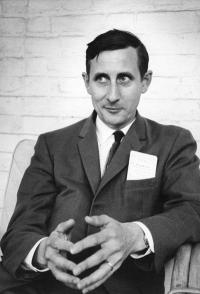The Other-Worldly Career of Freeman Dyson
Spring
2014
Connecting Worlds
2012 Quadrennial Physics Congress
The Other-Worldly Career of Freeman Dyson
Phillip F. Schewe, Director of Communication at the Joint Quantum Institute, a partnership between the National Institute of Standards and Technology and the University of Maryland in College Park
 Freeman Dyson is not one man but 10. His most famous scientific achievement, as a physicist, was his contribution to establishing quantum electrodynamics. But Dyson has also performed notable engineering feats, such as designing nuclear reactors and rocket ships. He has served in a crucial governmental advisory capacity, helping to secure a limited test ban treaty (whose 50th anniversary just occurred) and keeping tactical nuclear weapons out of Vietnam. While doing research in biology, he proposed a novel theory for the origin of life and wrote a book about it. As an astrophysicist, he helped launch in 1960 the search for extraterrestrial intelligence with his speculations about large-scale orbiting habitat platforms powered by stars, now better known as Dyson Spheres. He also helped create adaptive optics, a corrective system now used on most of the world’s large ground-based optical telescopes, and he ushered in the formal study of the cosmos at very distant times.
Freeman Dyson is not one man but 10. His most famous scientific achievement, as a physicist, was his contribution to establishing quantum electrodynamics. But Dyson has also performed notable engineering feats, such as designing nuclear reactors and rocket ships. He has served in a crucial governmental advisory capacity, helping to secure a limited test ban treaty (whose 50th anniversary just occurred) and keeping tactical nuclear weapons out of Vietnam. While doing research in biology, he proposed a novel theory for the origin of life and wrote a book about it. As an astrophysicist, he helped launch in 1960 the search for extraterrestrial intelligence with his speculations about large-scale orbiting habitat platforms powered by stars, now better known as Dyson Spheres. He also helped create adaptive optics, a corrective system now used on most of the world’s large ground-based optical telescopes, and he ushered in the formal study of the cosmos at very distant times.
Dyson admits to having a short attention span and believes that the current PhD system, which commits students pretty much to a fixed course of research on a single topic for five years or more, is too restrictive. Consequently, with the exception of two years at Cornell University in the 1950s, he has never taught at a university or supervised students. Nevertheless, he is committed to teaching in the larger sense, through his essays and his frequent appearances before student audiences. Dyson has been given two dozen honorary doctorates and has won many of the major physics prizes. But in his home, on the wall near the staircase, he displays a single framed award: the Oersted Medal, the highest award bestowed by the American Association of Physics Teachers, given to individuals who have had an outstanding, widespread, and lasting impact on the teaching of physics.
Dyson is better known now, at least among the general public, for his essays both in books and in The New York Review of Books. At the age of 90 he is still writing actively, and still proving controversial. His favorite topics: how the Internet and solar energy will eventually bring prosperity to poorer nations, without the need for expensive resources, as those countries become integrated into the world economy; the need for scientists to recognize the importance of religion and the arts in understanding the world; his argument that the current climate change debate is overheated, and that the good consequences of the changes will probably outweigh the bad; and the idea that biotechnology innovations should be carefully policed but promoted to raise standards of living.
Most daring of all are his long-term predictions—as a sort of cheerleader—concerning the eventual human migration into space. He is critical of the current human presence in space (the International Space Station) and believes that a grander human exploration of the solar system will begin only when the costs come down a lot. He figures that human habitation of space (probably on moons and comets in the Oort cloud but not planets) will be both liberating and scary, like the early voyages of Polynesians across the Pacific and Europeans across the Atlantic. Even if, through the use of genetic engineering for adapting to space conditions, the human race splinters into several rival species, Dyson believes such a gigantic upper migration is our ultimate destiny.
Putting these ideas into cogent essays as a way of getting society to ponder its far future will, I believe, prove to be Dyson’s most important legacy.
CONTINUE READING
Schewe is Dyson's first and only biographer, the author of Maverick Genius: The Pioneering Odyssey of Freeman Dyson, published in 2013 by St. Martin's Press: www.phillipfschewe.org.
